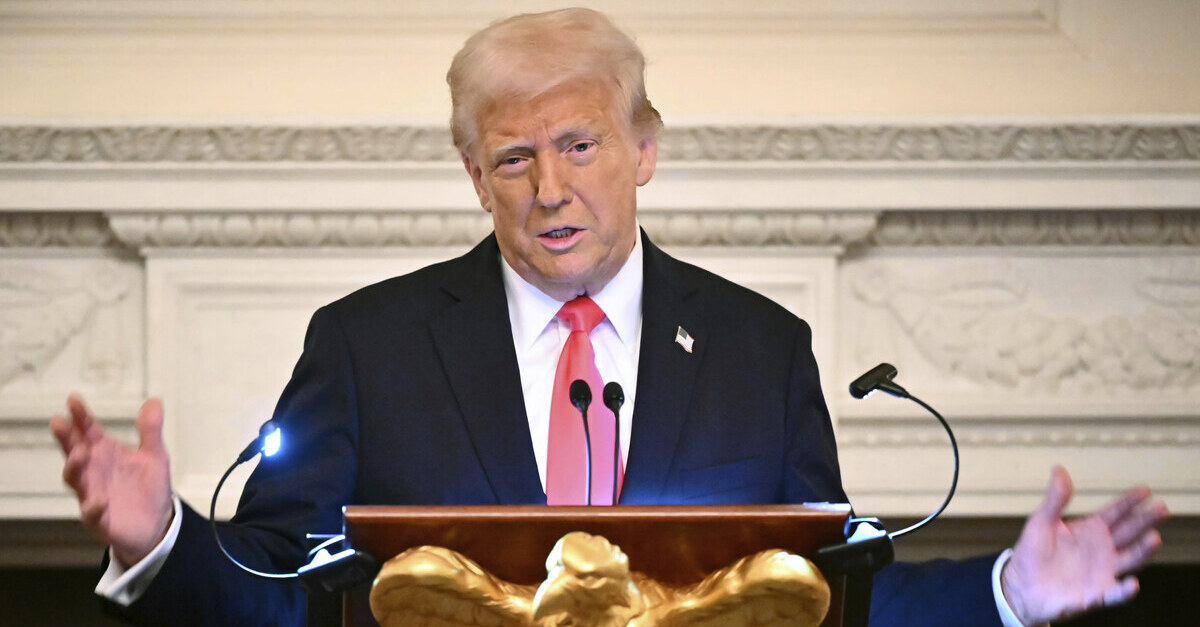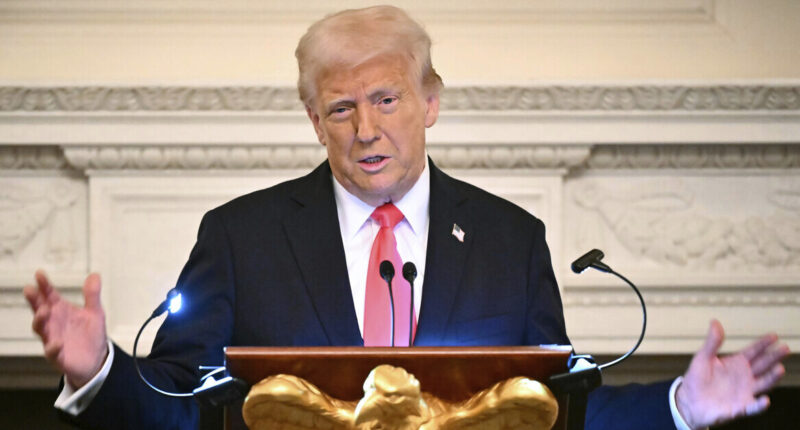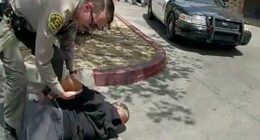
President Donald Trump gestures as he speaks during an Iftar dinner in the State Dining Room at the White House in Washington, Thursday, March 27, 2025 (Pool via AP).
A conservative legal group is taking legal action against the Trump administration concerning the tariffs on Chinese imports. They claim that the tariffs were implemented using emergency executive power in a manner that is deemed “unlawful”.
In a 29-page complaint filed at the Northern District of Florida on Thursday by the New Civil Liberties Alliance (NCLA), it is contended that the authority to impose tariffs solely rests with Congress and not the president.
“By invoking emergency power to impose an across-the-board tariff on imports from China that the statute does not authorize, President Trump has misused that power, usurped Congress’s right to control tariffs, and upset the Constitution’s separation of powers,” NCLA senior litigation counsel Andrew Morris said in a statement accompanying the lawsuit.
According to the nonprofit group, the statutes under which Trump purported to issue the levies — the International Emergency Economic Powers Act of 1977 (IEEPA) — grants the executive sweeping authority to quickly combat international economic crises, permitting the president to “order sanctions as a rapid response to international emergencies.” However, the NCLA asserts that the emergency statute does not allow the president to usurp the legislative branch’s control of the country’s purse strings through the unilateral imposition of tariffs.
“Congress passed the IEEPA to counter external emergencies, not to grant presidents a blank check to write domestic economic policy,” the complaint states.
The right-leaning legal group is seeking a court order declaring that Trump’s tariffs are an “unconstitutional exercise of legislative power” and enjoining them from being implemented and enforced.
The complaint alleges that Trump is the first president to use the emergency statute as a means of imposing tariffs, saying that fact is “not surprising” because “the statute does not even mention tariffs, nor does it say anything else suggesting it authorizes presidents to tax American citizens.”
“A tariff is a tax on Americans’ commerce with other countries,” the NCLA wrote. “The Constitution assigns Congress exclusive power to impose tariffs and regulate foreign commerce. Presidents can impose tariffs only when Congress grants permission, which it has done in carefully drawn trade statutes. These statutes typically authorize tariffs only on industries or countries that meet specified criteria, and only under specified conditions, after following specified procedures. Such statutes require advance investigations, detailed factual findings, and a close fit between the statutory authority and a tariff’s scope.”
Looking to the terms in the IEEPA, the suit argues that even looking at the statute in a light most favorable to Trump, his administration’s tariffs still run contra to the law because the IEEPA limits presidential actions to those “necessary” in addressing a specific emergency. In this case, the president declared an emergency over Chinese opioids being brought into the country.
“But his China Executive Orders show no connection between the opioid problem and the tariff he ordered — much less that the tariff is ‘necessary’ to resolve that problem,” the complaint states. “The means of an across-the-board tariff does not fit the end of stopping an influx of opioids, and is in no sense ‘necessary’ to that stated purpose.
Trump’s own words have further undermined his use of the emergency power, the NCLA claims, noting that the president has stated that he implemented the tariffs with the goal of reducing America’s trade deficit and increasing federal revenue.
Trump cited the same emergency statute on Wednesday when he unveiled another executive order that raised the percentage Americans will pay on imported Chinese products to 54%. The latest order defines the emergency as the U.S. trade deficit, saying it is “an unusual and extraordinary threat” to national security.
“The Constitutional power ‘to lay and collect Taxes, Duties, Imposts and Excises’ and ‘to regulate commerce with foreign Nations’ belongs to Congress,” NCLA senior litigation counsel John Vecchione said. “The Administration’s actions followed none of these constitutional commands, and the statute it cites does not even use the word ‘tariff’ or ‘tax.’ This unlawful ‘impost’ must fall.”
Love true crime? Sign up for our newsletter, The Law&Crime Docket, to get the latest real-life crime stories delivered right to your inbox.











